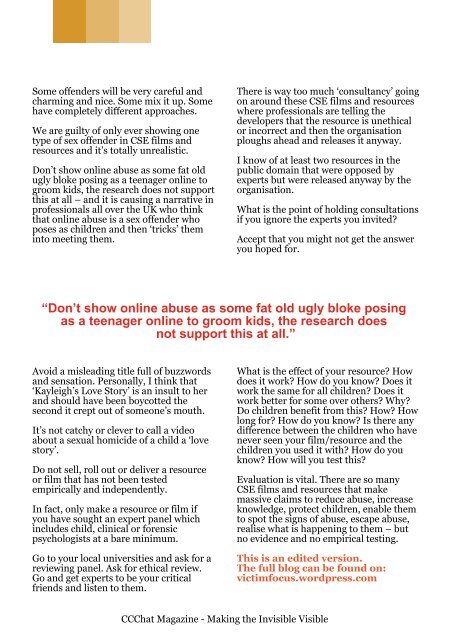CCChat-Magazine_3
Create successful ePaper yourself
Turn your PDF publications into a flip-book with our unique Google optimized e-Paper software.
Some offenders will be very careful and<br />
charming and nice. Some mix it up. Some<br />
have completely different approaches.<br />
We are guilty of only ever showing one<br />
type of sex offender in CSE films and<br />
resources and it’s totally unrealistic.<br />
Don’t show online abuse as some fat old<br />
ugly bloke posing as a teenager online to<br />
groom kids, the research does not support<br />
this at all – and it is causing a narrative in<br />
professionals all over the UK who think<br />
that online abuse is a sex offender who<br />
poses as children and then ‘tricks’ them<br />
into meeting them.<br />
There is way too much ‘consultancy’ going<br />
on around these CSE films and resources<br />
where professionals are telling the<br />
developers that the resource is unethical<br />
or incorrect and then the organisation<br />
ploughs ahead and releases it anyway.<br />
I know of at least two resources in the<br />
public domain that were opposed by<br />
experts but were released anyway by the<br />
organisation.<br />
What is the point of holding consultations<br />
if you ignore the experts you invited?<br />
Accept that you might not get the answer<br />
you hoped for.<br />
“Don’t show online abuse as some fat old ugly bloke posing<br />
as a teenager online to groom kids, the research does<br />
not support this at all.”<br />
Avoid a misleading title full of buzzwords<br />
and sensation. Personally, I think that<br />
‘Kayleigh’s Love Story’ is an insult to her<br />
and should have been boycotted the<br />
second it crept out of someone’s mouth.<br />
It’s not catchy or clever to call a video<br />
about a sexual homicide of a child a ‘love<br />
story’.<br />
Do not sell, roll out or deliver a resource<br />
or film that has not been tested<br />
empirically and independently.<br />
In fact, only make a resource or film if<br />
you have sought an expert panel which<br />
includes child, clinical or forensic<br />
psychologists at a bare minimum.<br />
Go to your local universities and ask for a<br />
reviewing panel. Ask for ethical review.<br />
Go and get experts to be your critical<br />
friends and listen to them.<br />
What is the effect of your resource? How<br />
does it work? How do you know? Does it<br />
work the same for all children? Does it<br />
work better for some over others? Why?<br />
Do children benefit from this? How? How<br />
long for? How do you know? Is there any<br />
difference between the children who have<br />
never seen your film/resource and the<br />
children you used it with? How do you<br />
know? How will you test this?<br />
Evaluation is vital. There are so many<br />
CSE films and resources that make<br />
massive claims to reduce abuse, increase<br />
knowledge, protect children, enable them<br />
to spot the signs of abuse, escape abuse,<br />
realise what is happening to them – but<br />
no evidence and no empirical testing.<br />
This is an edited version.<br />
The full blog can be found on:<br />
victimfocus.wordpress.com<br />
<strong>CCChat</strong> <strong>Magazine</strong> - Making the Invisible Visible


















